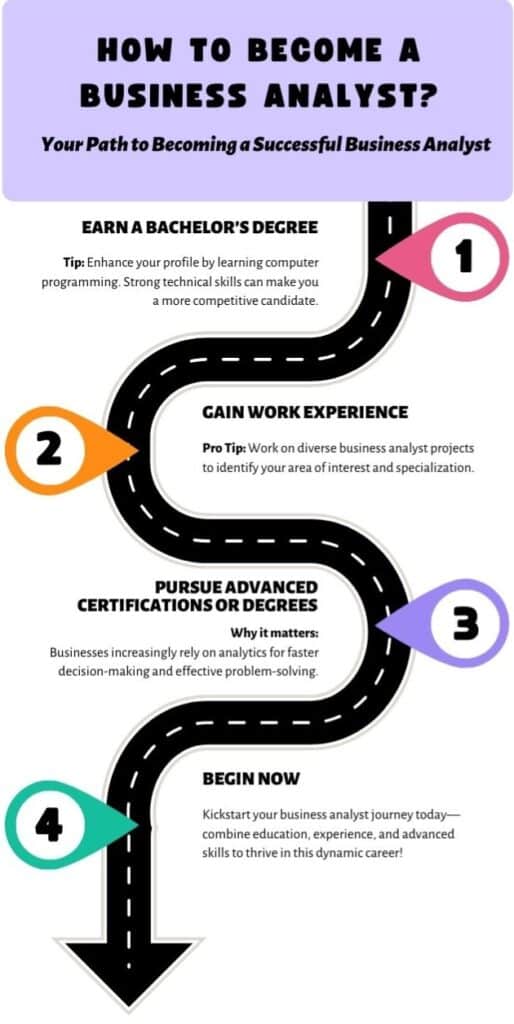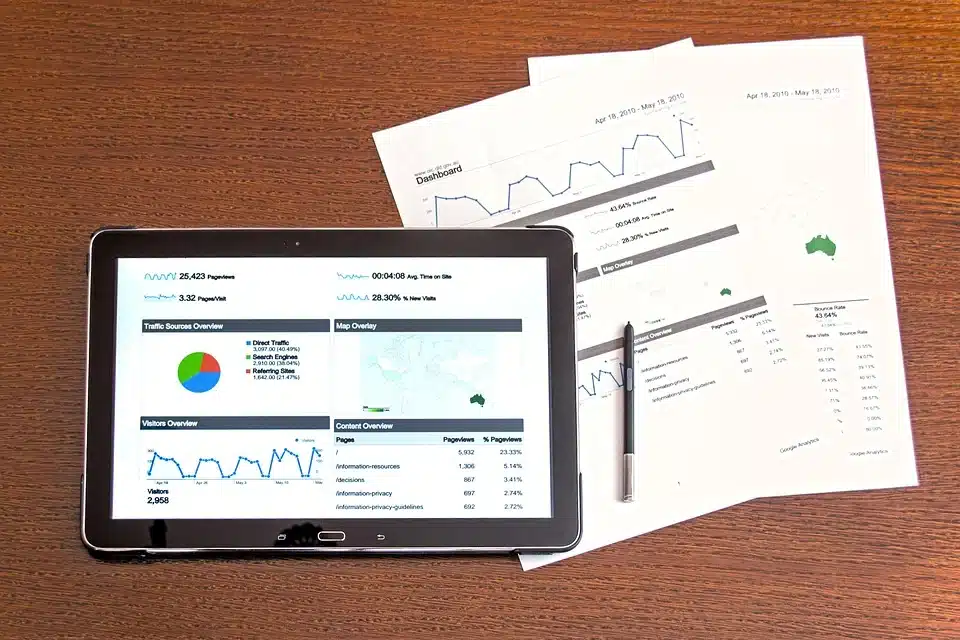Listen to this blog
As the business environment evolves, the role of a Business Analyst (BA) has undergone considerable transformation. From being traditionally seen as a bridge between IT and business, to now playing a crucial role in strategic decision making, business analysts have expanded their influence within organizations, big and small.
In this blog post, we’re going to explore these different roles in detail. We’ll examine the varying responsibilities, required skills, and potential career paths of each type of business analyst. Whether you’re a budding business analyst looking to find your niche, an experienced BA seeking to diversify your skill set, or simply intrigued by the field of business analysis, this comprehensive guide will offer valuable insights and practical advice.
Who is a business analyst?
A business analyst is a professional who analyzes an organization or business domain (real or hypothetical) and documents its business, processes, or systems, assessing the business model or its integration with technology. The role of a business analyst is to act as a bridge between different stakeholders in a company, facilitating communication and solution development. The role of a business analyst can vary greatly depending on the organization, but it generally involves requirement analysis, project management, solution assessment & validation, process improvement, communication and stakeholder engagement among other responsibilities.
The role of business analyst can be a critical one in any organization, as they help ensure that business needs and solutions align, leading to more efficient and effective processes, systems, and workflows.
Types of business analysts
Given below are the three broad business analyst roles and responsibilities:
Business Process Analyst
A specialized business analyst role that involves “thinking processes” is the business process analyst (BPA). When identifying process changes, BPAs consider company objectives to derive conclusions from the small print and connect them to the big picture. A business process analyst can often organize a lot of data inside a process framework.
Process mapping and business process reengineering are key skills that business process analysts must possess. They examine corporate procedures and workflows to see how they may be enhanced or automated. They facilitate process workshops and then use process maps and business requirement documents to capture any information obtained. They might also be asked to participate in the documentation of processes and discuss new process designs with stakeholders.
Business Systems Analyst
Business systems analysts analyze a company’s operating system, processes, and design enhancements using business and technological techniques. Through planning and implementation of information technology systems, they seek to assist a business in operating more effectively and efficiently.
To understand how to use cutting-edge technologies to help the business, they speak with executives and managers. They drew user guides and weighed the technology’s advantages and disadvantages. They are experts in the system the business employs. Let’s now clarify the distinction between a system analyst and a business analyst.
Generalist Business Analyst
In initiatives of different scope, a generalist practitioner often carries out business analysis tasks utilizing various approaches. They must be able to use several strategies in various situations. There are several tiers of generalist roles.
Business Analyst job roles
Here are some of the top business analyst job roles.
Business Analyst
A business analyst is a specialist that collaborates closely with stakeholders to establish goals, create best practices for data collecting, and assess current processes to discover areas for improvement to produce the desired result. The average yearly income for a business analyst in India is INR 8.5 LPA.
Business Architect
Leading the architecture of new organizations or re-architecting portions of existing ones is the primary role of a business architect. A business architect will assume a leadership position in the strategy and create a comprehensive, multifaceted business architecture to realize the objectives and solutions of an organization. The average yearly pay for a business architect in India is INR 20 LPA.
Business Process Analyst
Business process analysts gather information, examine it, and offer recommendations to accomplish project goals while creating client presentations. To promote process changes, their main objective is to evaluate business requirements and give evidence-based recommendations. The average yearly pay of a business process analyst in India is INR 5 LPA.
IT Business Analyst
Business administration and information technology are fields of expertise for IT business analysts. A business analyst in an IT company performs the duties of coordinating IT with the executive branch, enhancing the caliber of IT services, and assessing business requirements. In India, an IT analyst’s average salary is INR 9 LPA.
Business Intelligence Analyst
A business intelligence analyst’s job is to work with organizations to use data to find areas for improvement, detect patterns, and identify potential problems and solutions. Their efforts are intended to boost productivity and efficiency and increase revenue for the company. The average yearly income for a business intelligence analyst in India is INR 11 LPA.
Requirements Engineer
The analysis, documentation, coordination, and management of requirements for new software projects fall within the purview of requirement engineers. They recognise and comprehend the client’s project-specific requirements and clearly and formally record them. In India, a requirement engineer gets an average pay of INR 9 lakhs per annum. Salary projections are based on 70 incomes from different requirement engineers working in different businesses.
Systems Analyst
To satisfy the business requirements of companies and scale as they grow, systems analysts implement, operate, and support IT and information systems. They produce specifications and requirements for programmers and developers to follow, evaluate, write tests, and analyze data. Typically, they are not actively involved in developing hardware or software.
In India, a system analyst makes an average annual pay of INR 9.5 LPA.
Data Analyst
Data analysts look for solutions to customer-related issues by analyzing large data sets. A data analyst also informs management and other stakeholders of this information. They work in various fields, including business, banking, criminal justice, science, medicine, and government. The average pay for a data analyst in India is roughly INR 7 lakh.
Functional architect
Designing and updating an organization’s IT systems is the responsibility of functional architects, also referred to as IT architects and functional business analysts. Technical and managerial abilities are required for this domain. A functional architect must be able to identify an IT issue and create a solution when one arises. The average yearly income for a functional architect in India is INR 20 LPA.
Usability/UX Analyst
A UX analyst examines user interfaces and workflows to find areas that could be improved. They perform user experience and design idea testing. They are responsible for informing the development and UX teams of test results. UX analysts provide suggestions for improving interface designs in light of your findings. In India, a usability analyst makes an average income of INR 10 LPA.
Roles & responsibilities of business analyst
A business analyst is a critical part of any business and plays an essential role in your company’s success. But what does a business analyst do?
Here is precisely what a business analyst does:
Understand and articulate the business goals and objectives
Business analysts must understand the goals and objectives of the project, as well as how those goals and objectives align with the company’s overall mission and vision. They should be able to communicate how their work ties in with the company’s bigger picture.
Define requirements based on the product or service requirements
A business analyst should be able to define user requirements based on your organization’s needs. These requirements will help you create an effective product or service that meets those needs, which is critical for success in today’s marketplace.
Create documentation for the project
One of the roles of business analysts in agile projects is to create documentation that lays out how users will interact with a product or service while also explaining why they need it. This documentation should be easy for stakeholders to understand, so everyone can make informed decisions about where things go.
Communicate with stakeholders to gain consensus and buy-in
A business analyst must communicate effectively across all levels of an organization, including executives, managers, employees, customers, and suppliers.
Key skills of business analysts
A business analyst must handle a variety of tasks. Thus they must have a solid skill set that combines technical and non-technical abilities. Here are the key skills required for a business analyst to grow.
Recognising business goals: A business analyst should be able to clearly understand the goals and problems of an organization. They must be able to recognise business problems and determine the best fix. They should have enough knowledge about their employer’s industry. Typically, they seek to facilitate change to boost sales, scale up manufacturing, improve revenue streams, etc.
Creation of reports and dashboards: Business analysts create reports and dashboards to help businesses make data-driven decisions. They need to create visualizations that are easy to understand and communicate the information in a way that is engaging and persuasive.
Negotiation and cost-benefit analysis: Business analysts often have to negotiate with users about what they want from their systems, how much it will cost, and what level of functionality they can expect. Their ability to negotiate well is essential for successful project management.
Decision-making skills: Business analysts must be able to make decisions based on the information available, which means they need good decision-making skills. They also need strong critical thinking skills to ascertain whether their conclusions are valid based on the data points at hand.
Programming skills: Another skill that you should have is programming languages. Every business analyst must be able to program in at least one language, preferably two or three.
However, it is not as easy as knowing how to write code. You must also understand the concepts of object-oriented programming (OOP) and functional programming. Business analysts need to have a solid grasp of OOP and FP because these are the building blocks for all modern programming languages.
Critical and analytical thinking: Though it may seem simple, thinking is a skill that is often overlooked. One of the fundamental abilities of a business analyst is analytical and critical thinking. The needs of the client must be analyzed and translated by the business analyst. Also, before choosing the desired solution, a business analyst might evaluate a variety of choices with the aid of critical thinking. Business analysts concentrate on learning and comprehending the needs of the client. They can prioritize business requirements, thanks to critical thinking.
Interpersonal and communication skills: Understanding is essential, but so is being understood. A business analyst should be able to explain the needs to clients and stakeholders clearly and simply. At various stages of a project, such as when it is being launched, while gathering requirements, when working with stakeholders, while validating the final solution, and so forth, a business analyst requires effective communication and interpersonal skills. Business analysts communicate with stakeholders orally and in writing to share ideas, information, and viewpoints. Additionally, when leading meetings, a business analyst with strong interpersonal and communication skills will feel more confident.
How to become a business analyst?
Here’s how you can become a successful business analyst-

Step 1: Earn a bachelor’s degree in finance, accounting, or business administration
In addition to earning your business bachelor’s degree, you should learn some computer programming. Different business analyst positions call for varying degrees of technical expertise, but the stronger your programming skills are, the better prospect you will appear to be.
Step 2: Gain work experience
You can start by volunteering with a small business or by taking advantage of summer internship opportunities to gain expertise. If you are already employed by a company in a different capacity, volunteer to assist with business analyst-type assignments.
Being a business analyst involves a variety of tasks. Thus, numerous transferrable talents may be used in this position. People can enter the sector either with the expertise of a specific area of business, such as billing, customer service, or workflow, or with an understanding of a broad industry, such as banking, telecommunications, or government.
Make sure you gather experience by working on as many different types of business analyst projects as you can after being employed as an entry-level business analyst. Later, you can specialize in the domain or industry you are most interested in, and that experience may help you identify what that industry is.
Step 3: Obtain an advanced certificate or a master’s degree
Numerous colleges and institutions offer graduate certificates and master’s degrees in business analytics, which typically include classes in operations research, project management, database analytics, and predictive analytics. Businesses are adopting business analytics tools and approach more and more to make decisions and solve problems more quickly and effectively.
If you want a blend of business analytics and managerial skills, then you can opt for an MBA in Business Analytics. If you are looking for in-depth study and knowledge, then an MSc in Business Analytics can be an ideal choice. If you are already a business analyst and are looking to upskill, then you can choose to pursue an online certification in business analytics.
Read more: Reasons to choose masters in business analytics
Frequently asked questions
How do I get a job in business analytics with no experience?
You should develop domain knowledge if you don’t have experience or want to move from a different career to a business analyst role. You can enroll in an online business analytics certification course and get involved in the project work to become an expert in the field.
Can I learn business analytics on my own?
Yes, you can learn the basics of business analytics on your own. It involves a certain amount of hard work and adequate course materials. Suppose you are from a different domain or a working professional. In that case, it will be best to enroll in relevant online degree or certification courses that will help you to learn at your own pace, anytime and anywhere.
Does business analytics need math and Python?
Yes, but business analytics doesn’t involve the in-depth implementation of concepts in math and Python. Considering the primary language for the profession is numbers, math is a building stone for the career. Hence it is expected to have expertise in fundamental concepts, including correlation, causation, and test hypothesis.
What are the subjects needed to learn in business analytics?
In general, business analytics combines the field of business, management, and computer science. The important subjects that need to be learned in business analytics are finance, business analytics, account management, business management, human resource management, sales, and marketing.
Who can study business analytics?
Any interested candidate can pursue a career in business analytics. However, if they are not from a relevant academic background, including Science or Commerce, it will help them to explore math and statistics at a higher level.
Is coding required for a business analyst?
Coding is not necessarily required to work as an analytics professional. Even though business analysts deal with IT processes, the ability to write coding will help advance their career to new heights.
Can a fresher become a business analyst?
Yes, there are various business analytics jobs for freshers. They can make their way towards a career as business analysts in entry-level positions. However, they need to complete relevant online certification courses from reputed institutions to acquire great knowledge and industry experience.
Conclusion
Whether you want to pursue a master’s degree in business analytics or an online certification, look no further than Manipal Academy of Higher Education. Pursue any online course in business analytics through Online Manipal by attending flexible online classes, interacting with peers & faculty, and become a part of the prestigious Manipal alumni network.
Read more: Business analysis vs business analytics
Become future-ready with our online M.Sc. in Business Analytics program








